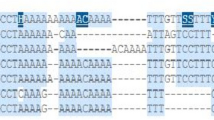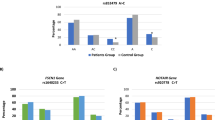Abstract
NAD(P)H: quinone oxidoreductase 1 (NQO1) C609T gene polymorphism has been reported to influence the risk for esophageal cancer (EC) in many studies; however, the results remain controversial and ambiguous. We therefore carried out a meta-analysis of published case–control studies to investigate the association between NQO1 C609T polymorphism and EC susceptibility. Electronic searches were conducted on links between this variant and EC in several databases. Odds ratios (ORs) and 95 % confidence intervals (CIs) for homozygous, dominant model, recessive model and allele were calculated to estimate the strength of associations in fixed and random effect models. Heterogeneity and publication bias were also assessed. A total of 11 case–control studies were identified, including1,619 cases and 2,101 controls. C allele was associated with a decreased susceptibility risk of EC compared with the T allele among Chinese (OR = 0.70; 95 % CI = 0.59–0.84). The contrast of homozygotes and the recessive and dominant models produced the same pattern of results as the allele contrast. Our pooled data suggest a significant association exists between NQO1 C609T polymorphism and EC among Chinese.
Similar content being viewed by others
References
Enzinger PC, Mayer RJ. Esophageal cancer. N Engl J Med. 2003;349:2241–52.
Ferlay J, Shin HR, Bray F, Forman D, Mathers C, Parkin DM. Estimates of worldwide burden of cancer in 2008: GLOBOCAN 2008. Int J Cancer. 2010;127:2893–917.
Jemal A, Bray F, Center MM, Ferlay J, Ward E, Forman D. Global cancer statistics. CA Cancer J Clin. 2011;61(2):69–90.
Zhong S, Zhao W, Lu C, Li B, Yuan Y, Guo D, et al. Glutathione S-transferase M1 null genotype contributes to increased risk of esophageal carcinoma in Chinese population. Tumour Biol. 2013;34(4):2403–7.
Zhang J, Zhou J, Zhang P, Wang W, Tao S, Wang M. A meta-analysis of the association between the hOGG1 Ser326Cys polymorphism and the risk of esophageal squamous cell carcinoma. PLoS One. 2013;8(6):e65742.
Jaiswal AK. Regulation of genes encoding NAD(P)H:quinone oxidoreductases. Free Radic Biol Med. 2000;29(3–4):254–62.
Traver RD, Siegel D, Beall HD, Phillips RM, Gibson NW, Franklin WA, et al. Characterization of a polymorphism in NAD(P)H: quinone oxidoreductase (DT-diaphorase). Br J Cancer. 1997;75:69–75.
Kuehl BL, Paterson JW, Peacock JW, Paterson MC, Rauth AM. Presence of a heterozygous substitution and its relationship to DT-diaphorase activity. Br J Cancer. 1995;72:555–61.
Sarbia M, Bitzer M, Siegel D, Ross D, Schulz WA, Zotz RB, et al. Association between NAD(P)H: quinone oxidoreductase 1 (NQ01) inactivating C609T polymorphism and adenocarcinoma of the upper gastrointestinal tract. Int J Cancer. 2003;107(3):381–6.
Umar M, Upadhyay R, Kumar S, Ghoshal UC, Mittal B. Null association of NQO1 609C>T and NQO2–3423G>A polymorphisms with susceptibility and prognosis of Esophageal cancer in north Indian population and meta-analysis. Cancer Epidemiol. 2012;36(6):e373–9.
Yanling H, Yuhong Z, Wenwu H, Lei X, Mingwu C. NQO1 C609T polymorphism and esophageal cancer risk: a HuGE review and meta-analysis. BMC Medical Genetics. 2013;14:31.
Berlin JA, Laird NM, Sacks HS, Chalmers TC. A comparison of statistical methods for combining event rates from clinical trials. Stat Med. 1989;8(2):141–51.
Poole C, Greenland S. Random-effects meta-analyses are not always conservative. Am J Epidemiol. 1999;150:469–75.
Mantel N, Haenszel W. Statistical aspects of the analysis of data from retrospective studies of disease. J Natl Cancer Inst. 1959;22:719–48.
DerSimonian R, Laird N. Meta-analysis in clinical trials. Control Clin Trials. 1986;7(3):177–88.
Cochran WG. The combination of estimates from different experiments. Biometrics. 1954;10:101–29.
di Martino E, Hardie LJ, Wild CP, Gong YY, Olliver JR, Gough MD, et al. The NAD(P)H:quinone oxidoreductase I C609T polymorphism modifies the risk of Barrett esophagus and esophageal adenocarcinoma. Genet Med. 2007;9(6):341–7.
Feng XX, Li ZF, Wang LB, Zhang JB, Lu ZX. Study on the relationship between polymorphisms of NQO1 gene and susceptibility to esophageal cancer. Chin J Dis Control Prev. 2008;12(2):112–4.
Hamajima N, Matsuo K, Iwata H, Shinoda M, Yamamura Y, Kato T, et al. NAD(P)H: quinone oxidoreductase 1 (NQO1) C609T polymorphism and the risk of eight cancers for Japanese. Int J Clin Oncol. 2002;7(2):103–8.
Malik MA, Zargar SA, Mittal B. Role of NQO1 609C>T and NQO2–3423G>A gene polymorphisms in esophageal cancer risk in Kashmir valley and meta analysis. Mol Biol Rep. 2012;39(9):9095–104.
Marjani HA, Biramijamal F, Rakhshani N, Hossein-Nezhad A, Malekzadeh R. Investigation of NQO1 genetic polymorphism, NQO1 gene expression and PAH-DNA adducts in ESCC. A case–control study from Iran. Genet Mol Res. 2010;9(1):239–49.
von Rahden BH, Stein HJ, Langer R, von Weyhern CW, Schenk E, Döring C, et al. C609T polymorphism of the NAD(P)H:quinone oxidoreductase I gene does not significantly affect susceptibility for esophageal adenocarcinoma. Int J Cancer. 2005;113(3):506–8.
Zhang J, Schulz WA, Li Y, Wang R, Zotz R, Wen D, et al. Association of NAD(P)H: quinone oxidoreductase 1 (NQO1) C609T polymorphism with esophageal squamous cell carcinoma in a German Caucasian and a northern Chinese population. Carcinogenesis. 2003;24(5):905–9.
Zhang JH, Li Y, Wang R, Geddert H, Guo W, Wen DG, et al. NQO1 C609T polymorphism associated with esophageal cancer and gastric cardiac carcinoma in North China. World J Gastroenterol. 2003;9(7):1390–3.
Zhang WC, Yin LH, Pu YP, Liang GY, Hu X, Liu YZ, et al. Relationship between quinone oxidoreductase 1 gene ns-SNP and genetic susceptibility of esophageal cancer. Chin J Prev Med. 2006;40:324–7.
Zhou YL, Chen HF, Shi XS, Zhou ZJ, Li GL, Pan PC, et al. A case–control study on the polymorphisms of NQO1 and susceptibility of esophageal cancer. Chin Cancer. 2006;15:659–63.
Kelsey KT, Ross D, Traver RD, Christiani DC, Zuo ZF, Spitz MR, et al. Ethnic variation in the prevalence of a common NAD(P)H quinone oxidoreductase polymorphism and its implications for anti-cancer chemotherapy. Br J Cancer. 1997;76:852–4.
Conflicts of interest
None
Author information
Authors and Affiliations
Corresponding author
Rights and permissions
About this article
Cite this article
Zhao, HY., Gu, Y. & Yi, YX. NQO1 C609T polymorphism is associated with esophageal cancer risk among Chinese: a meta-analysis. Tumor Biol. 35, 2199–2203 (2014). https://doi.org/10.1007/s13277-013-1292-z
Received:
Accepted:
Published:
Issue Date:
DOI: https://doi.org/10.1007/s13277-013-1292-z




